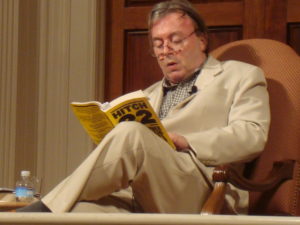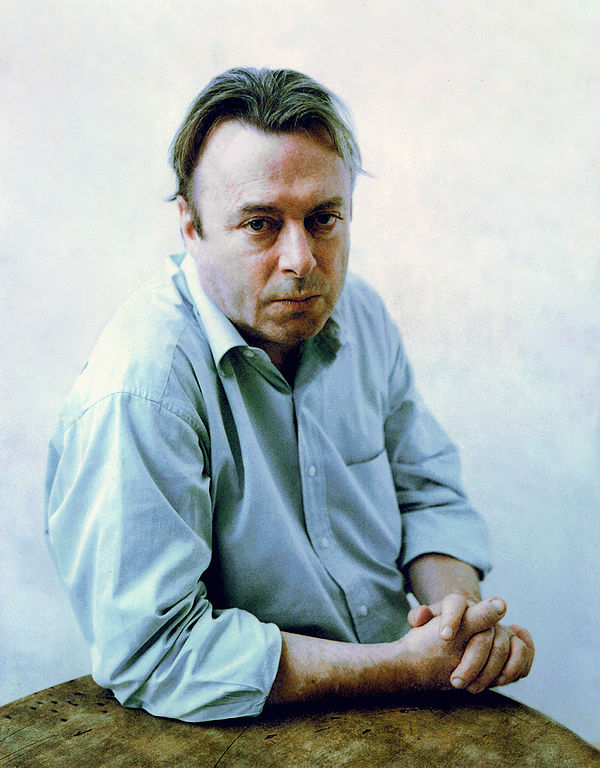Christopher Hitchens, atheist, iconoclast extraordinaire, and perhaps the most prolific and brilliant essayist of our time, has stage IV esophageal cancer. Even by cancer standards, this is a bad disease to have, and the odds are good that Mr. Hitchens will be dead before we take many more trips around the sun.
In the months since his unfortunate diagnosis, three distinct groups seem to have come out of the woodworks to pray about him and his disease. The first of these is the pathetic creeps who choose to spend their time praying for Hitchens’ demise to be slow and painful and for his suffering to continue into eternity after cancer finally kills him. These ingrates are self-evidently despicable, and I’ll waste no more time or ink on them here.
Another group of prayer-sayers includes those who wish to see a deathbed conversion from “Hitch,” as he is often called. This is relatively innocuous, but it is rather tasteless. After all, what would you think of me if I burst in on the deathbed of a religious person and told them that all they had to do to understand the universe was to abandon the convictions of a lifetime and discard that which they may well be clinging to for comfort in their most desperate hours? It wouldn’t be very nice of me at all, really, and I’d never think of doing that to someone. The time to pester someone or argue about their view of the universe is most emphatically not their weakest, dying hour.
This seems like a good place to interject the point that it is not, as many theists seem to believe, a noble act to tell lies about atheists having deathbed conversions. It seems to be widely believed that this is a common occurrence, but nearly every report of deathbed conversion that pops up is demonstrably false. That is not to say that no atheist has ever repented and turned to God in the last moments or hours of life; however, this is a far less common phenomenon than many people tend to imagine.
Praying for Christopher Hitchens’s Recovery
 A final group of those currently praying for Christopher are those who merely pray for his recovery. In interviews, Hitchens claims to take such sentiments very well and to appreciate it very much. I think anyone would appreciate knowing that, one way or another, people are pulling for their recovery. Further, if you read Hitchens’ work for more than ten minutes, I can almost guarantee you that you will see two words come up which are more important to him than any others. The first, which is not really salient to this discussion, is “irony.” The second is “solidarity.” Human solidarity is one of the most important elements of Hitchens’ emotional, intellectual, and public life. Indeed, it’s one of the foundational pillars of all human life. Prayers for an atheist’s recovery are, at their core, a nice gesture of solidarity that will most likely be appreciated regardless of whether the incantations are actually efficacious.
A final group of those currently praying for Christopher are those who merely pray for his recovery. In interviews, Hitchens claims to take such sentiments very well and to appreciate it very much. I think anyone would appreciate knowing that, one way or another, people are pulling for their recovery. Further, if you read Hitchens’ work for more than ten minutes, I can almost guarantee you that you will see two words come up which are more important to him than any others. The first, which is not really salient to this discussion, is “irony.” The second is “solidarity.” Human solidarity is one of the most important elements of Hitchens’ emotional, intellectual, and public life. Indeed, it’s one of the foundational pillars of all human life. Prayers for an atheist’s recovery are, at their core, a nice gesture of solidarity that will most likely be appreciated regardless of whether the incantations are actually efficacious.
Who will pray for Christopher Hitchens?
So the answer to the question, “who will pray for Christopher Hitchens?” is very simple: lots of people will pray for him, and lots of people do. Even I, a stone-cold anti-theist, have caught myself beseeching the universe on Hitch’s behalf on more than one occasion, murmuring things like, “please let him pull out of this,” and, for just a moment, really meaning it as a request. People are pretty well hardwired to look for human or humanoid intent in the things that happen to us and around us. We express this by personifying nature or culture in such a way that we give ourselves some being to propitiate to. We want to feel that someone is in control, because taking control of situations is the entire basis of our evolutionary adaptation. When things happen which we truly feel are out of our power to influence, we become very uncomfortable. Imagining we can mutter a request to some powerful , unseen agency is really just a latent way of trying to control the uncontrollable. Even we atheists do it, after a fashion, and Hitch has many prayers—and plenty of well-wishes—headed his way.
Please, let Hitch be okay.






